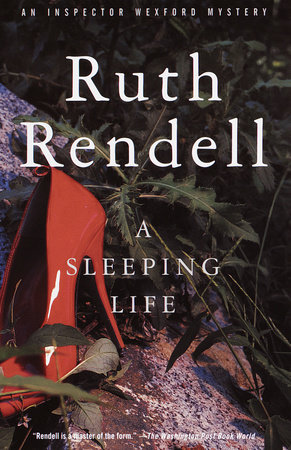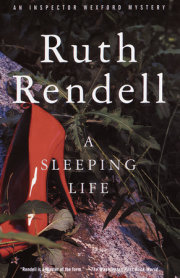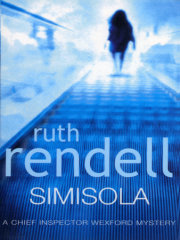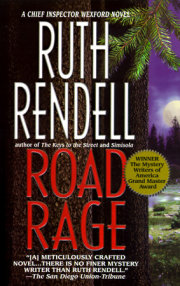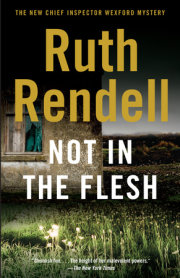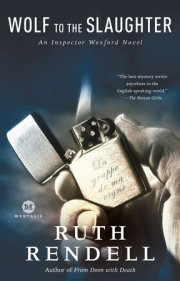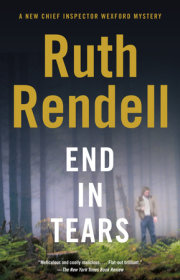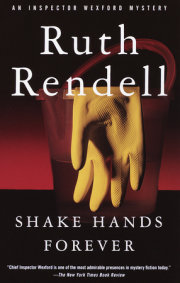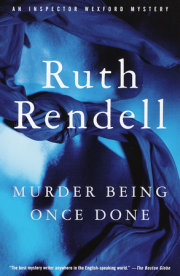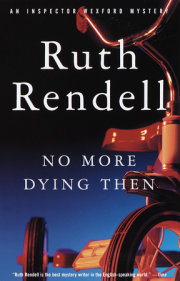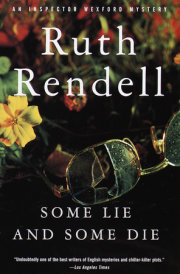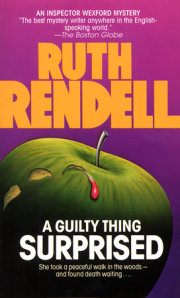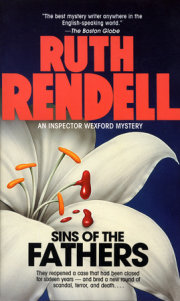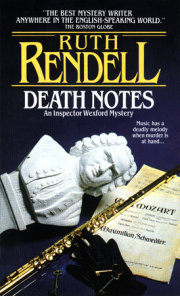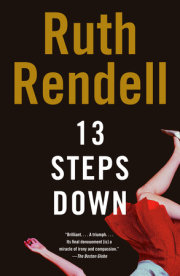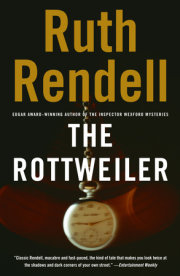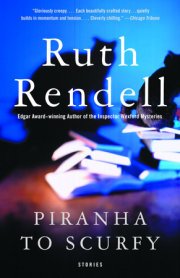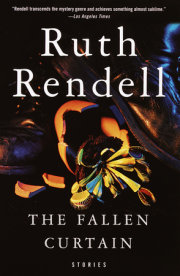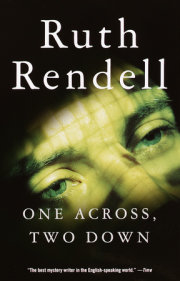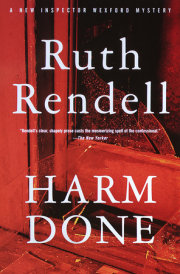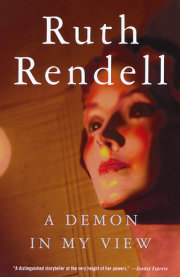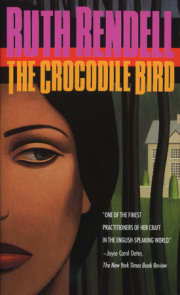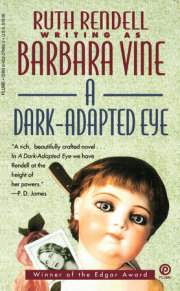1
Home early for once. Maybe he'd start getting home early regularly now August had begun, the silly season. Criminals as well as the law-abiding take their holidays in August. As he turned the car into his own road, Wexford remembered his grandsons would be there. Good. It would be light for another three hours, and he'd take Robin and Ben down to the river. Robin was always on about the river because his mother had read
The Wind in the Willows to him, and his great desire was to see a water rat swimming.
Sylvia's car was parked outside the house. Odd, thought Wexford. He'd understood Dora was having the boys for the afternoon as well as the evening and that they'd be staying the night. As he edged his own car past his daughter's into the drive, she came running out of the house with a screaming Ben in her arms and six-year-old Robin looking truculent at her heels. Robin rushed up to his grandfather.
"You promised we could see the water rat!"
"So you can as far as I'm concerned and if there's one about. I thought you were staying the night."
Sylvia's face was crimson, with rage or perhaps just from haste. It was very hot.
"Well, they're not. Thanks to my dear husband, nobody's going anywhere even though it does happen to be our wedding anniversary. Will you shut up, Ben! He's bringing a client home for dinner instead, if you please, and I, of course, as usual have to be the one to do the cooking and fetch the kids."
"Leave them here," said Wexford. "Why not?"
"Yes, leave us here," Robin shouted. "
Go on."
"Oh, no, that's out of the question. Why do you have to encourage them, Dad? I'm taking them home and Neil can have the pleasure of putting them to bed for once."
She thrust both children into the car and drove off. The windows of the car were all open, and the yells of the two little boys, for Robin had begun to back his brother up, vied with the roar of the ill-treated engine. Wexford shrugged and went indoors. Some sort of scene had evidently been taking place, but he knew his wife better than to suppose she would be much disturbed by it. True to his expectations, she was sitting placidly in the living room watching the tail end of a children's programme on television. A great many books had been pulled out of the shelves, and on a tower block of them sat a Teddy bear.
"What's got into Sylvia?"
"Women's Lib," said Dora Wexford. "If Neil wants to bring a client home he ought to cook the meal. He ought to come home in the afternoon and clean the house and lay the table. She's taken the children home for the sole purpose of getting him to put them to bed. And she's taking care to stir them up on the way to make sure he has a hard time of it."
"God. I always thought she was quite a sensible girl."
"She's got a bee in her bonnet about it. It's been going on for months. You are the people, we are the others. You are the masters, we are the chattels."
"Why haven't you told me about any of this?"
Dora switched off the television. "You've been busy. You wouldn't have wanted to listen to all this nonsense when you got home. I've been getting it every day."
Wexford raised his eyebrows. "It's nonsense?"
"Well, not entirely, of course. Men still do have a better time of it in this world than women, it's still a man's world. I can understand she doesn't like being stuck at home with the boys, wasting her life, as she puts it, while Neil gets more and more successful in his career." Dora smiled. "And she says she got more A Levels than he did. I can understand she gets bored when people come and the men talk to Neil about architecture and the women talk to her about polishing the bedroom furniture. Oh, I can
understand it."
Her husband looked hard at her. "You feel that way too?"
"Never you mind," said Dora, laughing now. "Let's forget our rather tiresome child. You're so early we might go out somewhere after we've eaten. Would you like to?"
"Love to." He hesitated, said quickly, "It's not threatening their marriage, is it? I've always thought of them as being so happy together."
"We have to hope it'll pass. Anything we do or say would only make things worse, wouldn't it?"
"Of course. Now where shall we go? Cinema? Or how about the open-air theatre at Sewingbury?"
Before she could give him an answer, the phone rang.
"Sylvia," she said. "She's realised Ben left his Teddy. You get it, darling. Oh, and Reg . . . ? Would you say we'll drop it on our way? I can't stand another session of the wounded wives tonight."
Wexford lifted the receiver. It wasn't his daughter. Dora knew it wasn't even before he spoke. She knew that look. All he said was "Yes" and "Sure, I will," but she knew. He hung up and said, "They don't all go on holiday in August. A body in a field not half a mile from here."
"Is it . . . ?"
"Not one of the people," said her husband dryly. "One of the others." He tightened the tie he had loosened, rolled down his shirtsleeves. "I'll have to go straightaway. What'll you do? Stir up the telly so I have a hard time of it putting it to rights? You must regret marrying me."
"No, but I'm working on it."
Wexford laughed, kissed her and drove back the way he had come.
Kingsmarkham is a sizeable town somewhere in the middle of Sussex, much built-up now on the Stowerton and Sewingbury sides, though open unspoilt country still remains at its northern end. There the High Street becomes the Pomfret Road, and there the pinewoods of Cheriton Forest clothe the hills.
Forest Road is the last street in the area to bear the postal address Kingsmarkham. It debouches directly from the Pomfret Road, but to reach it most of its few residents take the short cut from the end of the High Street by footpath across a field. Wexford parked his car at the point in Forest Road where this footpath entered it as an alley near the boundary fence of a pair of houses called Carlyle Villas. He swung into the alley and followed the footpath along a high privet hedge that bounded allotments. About a hundred yards ahead of him he could see a group of men gathered at the edge of a little copse.
Inspector Michael Burden was among them and so was Dr. Crocker, the police doctor, and a couple of photographers. As Wexford approached, Burden came up to him and said something in a low voice. Wexford nodded. Without looking at the body, he went up to Constable Loring who stood a little apart with a young man who looked pale and shaken.
"Mr. Parker?"
"That's right."
"I understand you found the body?"
Parker nodded. "Well, my son did."
He couldn't have been more than twenty-five himself.
"A
child?" said Wexford.
"He doesn't realise. I hope not. He's only six."
They sat down on a wooden seat the council had put there for pensioners to rest on. "Tell me what happened."
"I'd taken him round to my sister's, give the wife a bit of a break while she was putting the other two to bed. I live in one of the bungalows in Forest Road, Bella Vista, the one with the green roof. We were coming back, along the path here, and Nicky was playing with a ball. It went in the long grass under the hedge and he went to look for it. He said, 'Dad, there's a lady down there.' I sort of knew, I don't know how. I went and looked and I—well, I know I shouldn't have, but I sort of pulled her coat over her chest. Nicky, you see, he's only six, and there was—well, blood, a mess."
"I do see," said Wexford. "You didn't move anything else?"
Parker shook his head. "I told Nicky the lady was ill and we'd go home and phone the doctor. I said she'd be all right. I don't think he realised. I hope not. I got him home and phoned your people. Honestly, I wouldn't have touched her if I'd been on my own."
"This was an exception, Mr. Parker." Wexford smiled at him. "I'd have done the same in your place."
"He won't have to . . . ? I mean, there'll be an inquest, won't there? I mean, I'll have to go, I know that, but . . ."
"No, no. Good God, no. Get off home now and well see you again later. Thanks for your help."
Parker got up off the seat, glanced at the photographers, the huddle round the body, then turned round. "It's not for me to . . . well, I mean, I do know who she is. Perhaps you don't . . ."
"No, we don't yet. Who is she?"
"Well, a Miss Comfrey. She didn't actually live here, her dad lives here." Parker pointed back down the path. "Carlyle Villas, the one with the blue paint. She must have been stopping there. Her dad's in hospital. He's an old man, he broke his hip, and she must have come down to see him."
"Thanks, Mr. Parker."
Wexford crossed the sandy path, and Burden stepped aside for him to look down at the body. It was that of a middle-aged woman, biggish and gaunt. The face was coated with heavy make-up, clotted scarlet on the mouth, streaky blue on the crepe eyelids, a ghastly ochreish layer on the planes of cheek and forehead. The grey eyes were wide and staring, and in them Wexford thought he saw—it must be his imagination—a sardonic gleam, a glare, even in death, of scorn.
A fringe of dark hair just showed under a tightly tied blue headscarf. The body was clothed in a blue-and-pink printed dress of some synthetic material, and the matching jacket, which had no fastenings, had been drawn across the bodice. One of the high-heeled shoes had come off and hung suspended on a tangle of brambles. Across the hips lay a large scarlet handbag. There were no rings on the hands, no watch on either wrist, but a heavy necklace of red glass beads round the neck, and the nails, though short, were painted the same scarlet.
He knelt down and opened the handbag, covering his fingers with his handkerchief. Inside was a key ring with three keys on it, a box of matches, a packet of king-size cigarettes from which four had been smoked, a lipstick, an old-fashioned powder compact, a wallet, in the bottom of the bag some loose change. No purse. No letters or documents. The wallet, which was an expensive new one of black leather, contained forty-two pounds. She hadn't been killed for the money she had on her.
There was nothing to give him a clue to her address, her occupation or even her identity. No credit card, no bank card, no cheque book.
He closed the bag and parted her jacket The bodice of the dress was black with clotted blood, but plainly discernible in the dark matted mass were two cuts, the outward evidence of stab wounds.
2
Wexford moved away, and the doctor came back and knelt where he had knelt. He said to Loring,
"No sign of the weapon, I dare say?"
"No, sir, but we haven't made much of a search yet."
"Well, get searching, you and Gates and Marwood. A knife of some sort." The chances of its being there, he thought pessimistically, were slight. "And when you haven't found it," he said, "you can do a house-to-house down Forest Road. Get all you can about her and her movements, but leave Parker and Carlyle Villas to me and Mr. Burden."
Back to Dr. Crocker.
"How long has she been dead, Len?"
"Now, for God's sake, don't expect too much precision at this stage. Rigor's fully established, but the weather's been very hot, so its onset will have been more rapid. I'd say at least eighteen hours. Could be more."
"O.K." Wexford jerked his head at Burden. "There's nothing more here for us, Mike. Carlyle Villas and Parker next, I think."
Michael Burden was properly of too high a rank to accompany a chief inspector on calls of enquiry. He did so because that was the way they worked, the way it worked. They had always done so, and always would, in spite of disapproving mutterings from the Chief Constable.
Two tall men. Nearly twenty years separated them, and once they had been so dissimilar in appearance as to provide that juxtaposition of incongruities which is the stuff of humour. But Wexford had lost his abundant fat and become almost a gaunt man, while Burden had always been lean. He was the better looking of the two by far, with classical features that would have been handsome had they been less pinched by sour experience. Wexford was an ugly man, but his was the face that arrested the eye, compelled even the eyes of women, because it had in it so much lively intelligence and zest for life, so much vigour, and in spite of his seniority, so much more of the essence of youth.
Side by side, they walked along the footpath and down the alley into Forest Road, not speaking, for there was nothing yet to say. The woman was dead, but death by murder is in a way not an end but a beginning. The lives of the naturally dead may be buried with them. Hers would now gradually be exposed, event after event, obscure though she had been, until it took on the character of a celebrity's biography.
From the alley, they turned to the right and stood outside the pair of houses, cottages really, in front of which Wexford had parked his car. The houses shared a single gable, and in its apex was a plaster plaque bearing their name and the date of their construction: Carlyle Villas, 1902. Wexford knocked at the blue front door with little hope of getting an answer. There was none, and no one came when they rang the bell on the neighbouring front door, a far more trendy and ambitious affair of wrought iron and reeded glass.
Frustrated at this most promising port of call, they crossed the street. Forest Road was a cul-de-sac, ending in a stone wall, behind which meadows swelled and the forest sprawled. It contained about a dozen houses, apart from Carlyle Villas, a clutch of tiny cottages at the wall end, two or three newer bungalows, a squat grey stone lodge that had once stood at the gates of a long-vanished mansion. One of the bungalows, built at the period when Hollywood's influence penetrated even this corner of Sussex, had windows of curved glass and a roof of green pantiles. Bella Vista.
The child Nicky was still up, sitting with his mother in a living room that had the same sort of untidy look as the one Wexford had left an hour before. But if Parker hadn't introduced this girl as his wife, Wexford would have taken her for no more than an adolescent. She had the smooth brow and bunchy checks of a child, the silken hair, the innocent eyes. She must have been married at sixteen, though she looked no more than that now.
Parker said with ferocious winks, "This gentleman's a doctor, come to tell us the poor lady's all right."
Nicky buried his face in his mother's shoulder.
"Quite all right," Wexford lied. "She'll be fine." They say the dead are well . . .
"You get along to Nanna's room then, Nicky, and she'll let you watch her T.V."
The tension lightened on his departure. "Thanks," said Parker. "I only hope it isn't going to have a bad effect on him, poor kid."
"Don't worry. He's too young to see newspapers, but you'll have to exercise a bit of censorship when it comes to the T.V. Now, Mr. Parker, I think you said Miss—er—Comfrey's father was in hospital. D'you know which hospital?"
"Stowerton. The infirmary. He had an accident last—when would it have been, Stell?"
"About May," said Stella Parker. "Miss Comfrey came down to see him, came in a taxi from the station, and when he saw her he rushed out of the house and fell over on the path and broke his hip. Just like that it happened. Her and the taximan, they took him to the hospital in the same taxi, and he's been there ever since. I never saw it. Mrs. Crown told me. Miss Comfrey'd been down once to see him since. She never did come much, did she, Brian?"
"Not more than once or twice a year," said Parker.
"I knew she was coming yesterday. Mrs. Crown told me. I saw her in the Post Office and she said Rhoda'd phoned to say she was coming on account of old Mr. Comfrey'd had a stroke. But I never saw her, didn't really know her to speak to."
Burden said, "Who is Mrs. Crown?"
"Miss Comfrey's auntie. She lives in the next house to old Mr. Comfrey. She's the one you want to see."
"No doubt, but there's no one in."
"I tell you what," said Stella Parker who seemed to have twice her husband's grasp and intelligence, "I don't want to put myself forward, but I do read detective books, and if it's sort of background stuff you want, you couldn't do better than talk to Brian's gran. She's lived here all her life, she was born in one of those cottages."
"Your grandmother lives with you?"
"Helped us buy this place with her savings," said Parker, "and moved in with us. It works O.K., doesn't it, Stell? She's a wonder, my gran."
Wexford smiled and got up. "I may want to talk to her, but not tonight. You'll be notified about the inquest, Mr. Parker. It shouldn't be too much of an ordeal. Now, d'you know when Mrs. Crown will be home?"
"When the pubs turn out," said Parker.
"I think the infirmary next, Mike," said Wexford. "From the vague sort of time Crocker gave us, it's beginning to look to me as if Rhoda Comfrey was killed on her way back from visiting her father in hospital. She'd have used that footpath as a short cut from the bus stop."
"Visiting time at Stowerton's seven till eight in the evenings," said Burden. "We may be able to fix the time of death more accurately this way than by any post-mortem findings."
"The pub-orientated aunt should help us there. If this old boy's
compos mentis, we'll get his daughter's London address from him."
"Well also have to break the news," said Burden.
Departing visitors were queueing at the bus stop outside Stowerton Royal Infirmary. Had Rhoda Comfrey queued there on the previous night? It was ten past eight.
A man in the porter's lodge told them that James Albert Comfrey was a patient in Lytton Ward. They went along a corridor and up two flights of stairs. A pair of glass double doors, the entrance to Lytton Ward, were closed. As Wexford pushed them open, a young nurse of Malaysian or Thai origin popped up in their path and announced in a chirrup that they couldn't come in now.
"Police," said Burden. "We'd like to see the sister in charge."
"If you please, my dear," said Wexford, and the girl gave him a broad smile before hurrying off. "Do you have to be so bloody rude, Mike?"
She came back with Sister Lynch, a tall dark-haired Irishwoman in her late twenties.
"What can I do for you gentlemen?" She listened, clicked her tongue as Wexford gave her the bare details. "There's a terrible thing. A woman's not safe to walk abroad. And Miss Comfrey in here only last night to see her father."
"We'll have to see him, Sister."
"Not tonight you won't, Chief Inspector. I'm sure I'm sorry, but I couldn't allow it, not with the old gentlemen all settling down for the night. They'd none of them get a wink of sleep, and it's going off duty I am myself in ten minutes. I'll tell him myself tomorrow, though whether it'll sink in at all I doubt."
"He's senile?"
"There's a word, Chief Inspector, that I'm never knowing the meaning of. Eighty-five he is, and he's had a major stroke. Mostly he sleeps. If that's to be senile, senile he is. You'll be wasting your valuable time seeing him. I'll break it to him as best I can. Now would there be anything else?"
"Miss Comfrey's home address, please."
"Certainly." Sister Lynch beckoned to a dark-skinned girl who had appeared, pushing a trolley of drugs. "Would you get Miss Comfrey's home address from records, Nurse Mahmud?"
"Did you talk to Miss Comfrey last night, Sister?"
"No more than to say hallo and that the old gentleman was just the same. And I said good-bye to her too. She was talking to Mrs. Wells and they left together. Mrs. Wells's husband is in the next bed to Mr. Comfrey. Here's the address you were wanting. Thank you, nurse. Number one, Carlyle Villas, Forest Road, Kingsmarkham." Sister Lynch studied the card which had been handed to her. "No phone, I see."
"I'm afraid you've got Mr. Comfrey's address there," said Wexford. "It's his daughter's we want."
"But that is his daughter's, his and his daughter's."
Wexford shook his head. "No. She lived in London."
"It's the only one we have," said Sister Lynch, a slight edge to her voice. "As far as we know, Miss Comfrey lived in Kingsmarkham with her father."
"Then I'm afraid you were misled. Suppose you had had to get in touch with her—for instance, if her father had taken a turn for the wors—-how would you have done so?"
"Notified her by letter. Or sent a messenger." Sister Lynch had begun to look huffy. He was questioning her efficiency. "That wouldn't have been necessary. Miss Comfrey phoned in almost every day. Last Thursday, now, she phoned on the very day her father had his stroke."
"And yet you say she hadn't a phone? Sister, I need that address. I shall have to see Mr. Comfrey."
Her eyes went to her watch and noted the time. She said very sharply. "Aren't I telling you, the poor old gentleman's no more than a vegetable at all? As for giving you an address, you'd as likely get an answer out of my little dog."
"Very well. In the absence of Miss Comfrey's address, I'll have Mrs. Wells's, please." This was provided, and Wexford said, "We'll come back tomorrow."
"You must suit yourselves. And now I'll take my leave of you."
Wexford murmured as they left, "There is nothing you could take from me that I would more willingly part withal," and then to Burden, who was smugly looking as if his early rudeness had been justified and he hoped his superior realised it, "Well get it from the aunt. Odd, though, isn't it, her not giving her home address to the hospital?"
"Oh, I don't know. Underhand, but not odd. These old people can be a terrible drag. And it's always the women who are expected to look after them. I mean, old Comfrey'll be let out some time, and he won't be able to live on his own any more. A single woman and a daughter is a gift to all those busybody doctors and nurses and social workers. They'd seize on her. Wouldn't even consider expecting it of a son. If she gave them her real address, they'd pounce on that as a convalescent home for the old boy."
"You're the last person I thought I'd ever hear handing out Women's Lib propaganda," said Wexford. "Wonders will never cease. But doesn't it strike you that your theory only increases her chances of getting stuck with her father? They think she's on the spot, they think she lives with him already."
"There'll be an explanation. It isn't important, is it?"
"It's a departure from the norm, and that makes it important to me. I think Mrs. Wells next, Mike, and then back to Forest Road to wait for the aunt."
Mrs. Wells was seventy years old, slow of speech and rather confused. She had seen and spoken to Rhoda Comfrey twice before on her previous visits to the hospital, once in May and once in July. On the evening before they had got on the bus together outside the hospital at eight-fifteen. What had they talked about? Mrs. Wells thought it had mostly been about her husband's hip operation. Miss Comfrey hadn't said much, had seemed a bit nervous and uneasy. Worried about her father, Mrs. Wells thought. No, she didn't know her London address, believed in fact that she lived in Forest Road where she had said she was returning. Mrs. Wells had left the bus at the Kingsbrook Bridge, but her companion had remained on it, having a ticket to the next fare stage.
They returned to the police station. The weapon hadn't been found, and the house-to-house enquiry made by Loring, Marwood and Gates had produced negative results. No one in the cottages or the bungalows had heard or seen anything untoward on the previous evening. The inhabitants of the single detached house were away on holiday, and nobody had been working on the allotments. Rhoda Comfrey had been slightly known to everyone the three men had questioned, but only one had seen her on the previous day, and that had been when she left her father's house at about six-twenty to catch the bus for Stowerton. Her London address was unknown to any of the residents of Forest Road.
"I want you to get back there," Wexford said to Loring, "and wait for Mrs. Crown. I'm going home for an hour to get a bite to eat. When she comes in, call me on my home number."
Copyright © 2000 by Ruth Rendell. All rights reserved. No part of this excerpt may be reproduced or reprinted without permission in writing from the publisher.

